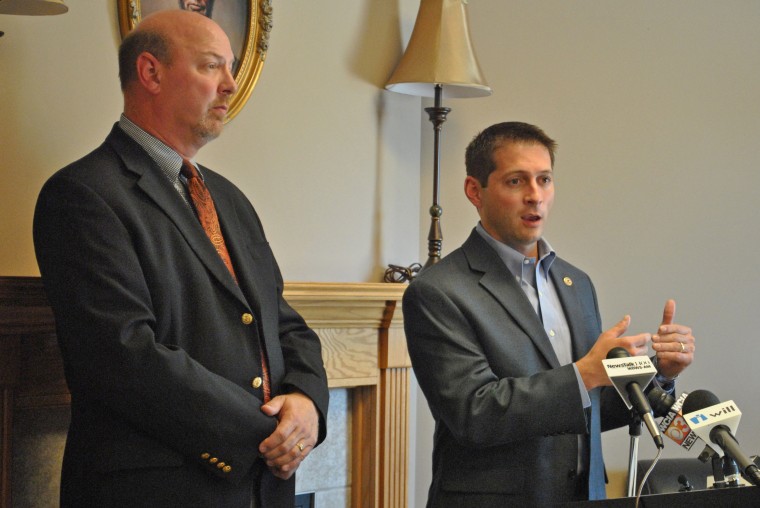State moves to abolish, rather than regulate, abused scholarships
From left, Representatives Chad Hays and Jason Barickman call for an end to the General Assembly Scholarship program on Tuesday amidst an investigation regarding the wrongdoing behind the selection process.
August 30, 2011
The General Assembly Scholarship may soon be a thing of the past due to recent controversy surrounding the state’s tuition waivers.
State representatives Jason Barickman, R-105; Chad Hays, R-104; and Chapin Rose, R-110, called Tuesday for the termination of the scholarship, citing allegations of its abuse from other politicians and the money it takes away from other Illinois public universities.
Each member of the General Assembly can nominate two individuals living in their district for a scholarship to attend a state-supported university. Hays said when the scholarship began, it was intended to ensure that people from low economic backgrounds could afford college.
Along with State Sen. Martin Sandoval, D-12 — a Cicero Democrat who awarded the scholarship to five students living at the same address but with different surnames — State Rep. Dan Burke, D-Chicago, has also been accused of handing this scholarship to people with close personal ties.
Hays said Illinois has the reputation of being one of the most corrupt states in the country, and that a lot of respect for the state’s government has been diminished.
Get The Daily Illini in your inbox!
Hays did not award this scholarship to anyone in his district, he said.
“You gain back the public trust and you rebuild that one act of integrity at a time,” Hays said.
Misuse of the scholarship by state politicians was not the only issue these representatives had, with Hays saying the financial constraints put a huge burden on public colleges, especially given the economic situation today.
Barickman said the money that schools lose from this scholarship may have an effect on universities making up for lost tuition. He also added that the repeal of the award has received bipartisan support. Gov. Pat Quinn vetoed a bill passed by the General Assembly that would bar legislators from giving out the scholarship to relatives, instead asking that the program be abolished altogether.
“Gov. Quinn has been talking about this issue since his budget address earlier in the year,” Barickman said. “I think if we could get a roll call vote on this bill with all the current public pressure and the governor’s presumed support for it, we might be able to put the votes together to get it passed.”
Some of the scholarship’s recipients are bombarded with questions about their relationship with their district legislator, Hays said, adding that the program is far from what it used to be when it started.
Barickman said the program is unique because it allows a legislator to award a scholarship to someone with the only stipulations being that the person has to live in a certain district.
Matt Vanover, communications director for the Illinois Board of Education, said the Board supports Quinn’s recent proposal to get rid of the program.
“The agency would support it because there have been a number of issues with the program over the years,” Vanover said.
He added that the Board would consider moving the program to the Illinois Student Assistance Commission, where it would be based on merit and need basis.







